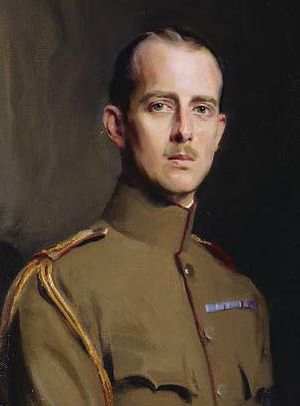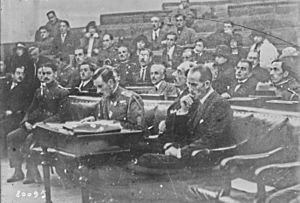Prince Andrew of Greece and Denmark facts for kids
Quick facts for kids Prince Andrew |
|
|---|---|

Portrait by Philip de László, 1913
|
|
| Born | 2 February 1882 Athens, Greece |
| Died | 3 December 1944 (aged 62) Hotel Metropole, Monte Carlo, Principality of Monaco |
| Burial | Royal Cemetery, Tatoi Palace, Athens, Greece |
| Spouse | |
| Issue |
|
| House | Glücksburg |
| Father | George I of Greece |
| Mother | Olga Constantinovna of Russia |
| Military career | |
| Allegiance | |
| Service/ |
|
| Years of service | 1901–1909 1912–1917 1920–1922 |
| Rank | Major General |
| Commands held | V Army Corps II Army Corps |
| Battles/wars | Balkan Wars
|
Prince Andrew of Greece and Denmark (Greek: Ανδρέας; Danish: Andreas; 2 February 1882 – 3 December 1944) was a member of the Greek royal family. He was the seventh child and fourth son of King George I of Greece. He was also a grandson of Christian IX of Denmark. Prince Andrew was the father of Prince Philip, Duke of Edinburgh, who married Elizabeth II, the Queen of the United Kingdom.
Prince Andrew was a soldier for most of his life. He started military training when he was young. He fought in the Balkan Wars and the Greco-Turkish War (1919–1922). After a war defeat, he was blamed and had to leave Greece. He spent most of his later life in France.
By 1930, Prince Andrew and his wife, Princess Alice of Battenberg, were living separately. His only son, Prince Philip, served in the British navy during World War II. Meanwhile, his four daughters married German men. Some of his sons-in-law had connections to the Nazis. Prince Andrew died in Monte Carlo in 1944. He had not seen his wife or son since 1939 due to the war.
Contents
Early Life and Training
Prince Andrew was born at the Tatoi Palace near Athens on 2 February 1882. He was the fourth son of George I of Greece. As a prince, he was part of the royal family of Greece and Denmark. This meant he could inherit the thrones of both countries.
He learned many languages, including Greek, Danish, German, French, English, and Russian. He went to cadet school in Athens. He also had private lessons in military subjects. His teacher said he was "quick and intelligent."
Even though he was near-sighted, Andrew joined the army. He became a cavalry officer in May 1901.
Marriage and Family
In 1902, Prince Andrew met Princess Alice of Battenberg in London. This was during the celebration for King Edward VII's coronation. King Edward was Andrew's uncle and Alice's great-uncle. Andrew and Alice fell in love.
They got married on 6 October 1903 in Darmstadt, Germany. They had two wedding ceremonies. One was Lutheran and the other was Greek Orthodox. Prince Andrew and Princess Alice had five children. They had four daughters and one son. All their children later had their own families.
Early Military Career
In 1909, there was a political change in Greece. The government did not support the union of Crete with Greece. A group of army officers formed a Military League. They demanded that royal princes leave the army. This led to Prince Andrew leaving the army.
A few years later, the Balkan Wars began in 1912. Andrew was allowed to rejoin the army. He became a lieutenant colonel. He was put in charge of a field hospital. During this war, his father was killed. Andrew inherited a villa called Mon Repos on the island of Corfu.
By 1914, Andrew held honorary military roles in Germany and Russia. He also had knighthoods from several countries.
World War I and Exile
During World War I, Andrew continued to visit Britain. Some people in the British government suspected him of being a German agent. His brother, King Constantine, wanted Greece to stay neutral in the war. However, the elected government supported the Allies.
By June 1917, King Constantine's neutral stance became a problem. He had to give up his throne. The Greek royal family, including Andrew, was forced to leave Greece. They lived in Switzerland for several years.
Return and Second Exile
After three years, King Constantine returned to the throne. Andrew was again allowed to rejoin the army. He was promoted to major-general. The family moved back to their home at Mon Repos.
Andrew was given command of the Second Army Corps. This was during the Battle of the Sakarya in the Greco-Turkish War (1919–1922). Andrew did not think highly of his commanders. He believed they were not good at their jobs. He was ordered to attack Turkish positions. He thought this was a very risky move.
Andrew decided to follow his own plan to protect his soldiers. They were low on food and ammunition. This upset the commanding general. Andrew's troops had to retreat. He was later removed from his command.
In August 1922, Greece lost the war in Asia Minor. This led to a revolution in Greece. Prince Andrew was arrested and put on trial. He was found guilty of "disobeying an order." Many people on trial were executed. British diplomats worried Andrew was in danger too.
Andrew was spared, but he was banished from Greece for life. His family left Greece on a British ship, HMS Calypso. They settled in Saint-Cloud, near Paris. Andrew and his family lost their Greek nationality. They traveled using Danish passports.
In 1930, Andrew wrote a book called Towards Disaster. In it, he defended his actions during the war. He lived a quiet life after this, even though he was only in his forties. His family became separated during this time. Princess Alice had health struggles and was in a hospital in Switzerland. Their daughters married and moved to Germany. Prince Philip was sent to school in Britain. Andrew went to live in the South of France.
Later Life and World War II
In France, Andrew lived in small apartments or hotels. He also spent time on a yacht with a close friend. His marriage to Alice was effectively over. After she recovered, Alice returned to Greece.
In 1936, the banishment order against Andrew was lifted. He visited Greece briefly that May. The next year, his daughter Cecilie, her husband, and two of their children died in a plane crash. Andrew met Alice at the funeral. His sixteen-year-old son, Prince Philip, also attended.
During World War II, Andrew was stuck in Vichy France. His son, Prince Philip, fought for Britain. They could not see or write to each other. Andrew's three surviving sons-in-law fought for Germany. One was a member of the Nazi Party. For five years, Andrew did not see his wife or son.
Death and Burial
Prince Andrew died in the Hotel Metropole, Monte Carlo, Monaco, in December 1944. He died from heart failure. He was first buried in a Russian Orthodox church in Nice. In 1946, his body was moved to the royal cemetery at Tatoi Palace in Greece.
Prince Philip traveled to Monte Carlo to collect his father's belongings. He took a signet ring and a shaving brush. Prince Andrew left most of his money to Philip. However, he also left behind a large debt.
Honours and Awards
Prince Andrew received many honours and awards during his life. Here are some of them:
 Kingdom of Greece: Grand Cross of the Order of the Redeemer
Kingdom of Greece: Grand Cross of the Order of the Redeemer Denmark:
Denmark:
- Knight of the Order of the Elephant, 6 August 1902
- Cross of Honour of the Order of the Dannebrog, 9 November 1902
 German Empire: Knight of the Order of the Black Eagle
German Empire: Knight of the Order of the Black Eagle Kingdom of Italy: Knight of the Supreme Order of the Most Holy Annunciation, 8 April 1907
Kingdom of Italy: Knight of the Supreme Order of the Most Holy Annunciation, 8 April 1907 Monaco: Grand Cross of the Order of Saint-Charles, 14 March 1940
Monaco: Grand Cross of the Order of Saint-Charles, 14 March 1940 Norway: Grand Cross of the Royal Norwegian Order of Saint Olav, with Collar, 3 July 1908
Norway: Grand Cross of the Royal Norwegian Order of Saint Olav, with Collar, 3 July 1908 Russian Empire: Knight of the Order of Saint Andrew the Apostle the First-called, 1903
Russian Empire: Knight of the Order of Saint Andrew the Apostle the First-called, 1903 Spain: Grand Cross of the Royal and Distinguished Order of Charles III, with Collar, 30 May 1906
Spain: Grand Cross of the Royal and Distinguished Order of Charles III, with Collar, 30 May 1906 United Kingdom: Honorary Knight Grand Cross of the Royal Victorian Order, 22 August 1902
United Kingdom: Honorary Knight Grand Cross of the Royal Victorian Order, 22 August 1902
His Children
Prince Andrew and Princess Alice had five children. Here is a list of their children:
| Name | Birth | Death | Marriage | Their children | |
|---|---|---|---|---|---|
| Date | Spouse | ||||
| Princess Margarita | 18 April 1905 | 24 April 1981 (aged 76) | 20 April 1931 | Gottfried, Prince of Hohenlohe-Langenburg |
|
| Princess Theodora | 30 May 1906 | 16 October 1969 (aged 63) | 17 August 1931 | Berthold, Margrave of Baden |
|
| Princess Cecilie | 22 June 1911 | 16 November 1937 (aged 26) | 2 February 1931 | Georg Donatus, Hereditary Grand Duke of Hesse |
|
| Princess Sophie | 26 June 1914 | 24 November 2001 (aged 87) | 15 December 1930 | Prince Christoph of Hesse |
|
| 23 April 1946 | Prince George William of Hanover |
|
|||
| Prince Philip | 10 June 1921 | 9 April 2021 (aged 99) | 20 November 1947 | Elizabeth II, Queen of the United Kingdom | |
See also
 In Spanish: Andrés de Grecia para niños
In Spanish: Andrés de Grecia para niños
 | Selma Burke |
 | Pauline Powell Burns |
 | Frederick J. Brown |
 | Robert Blackburn |


